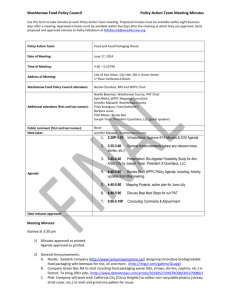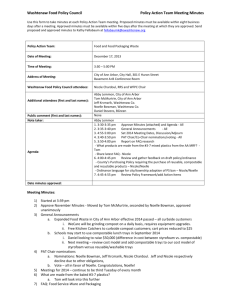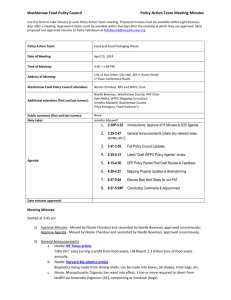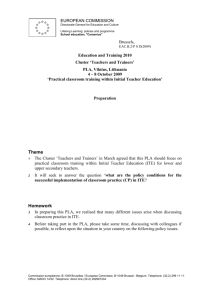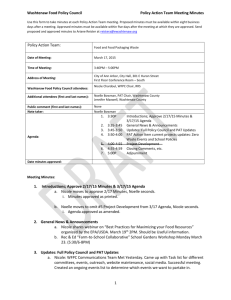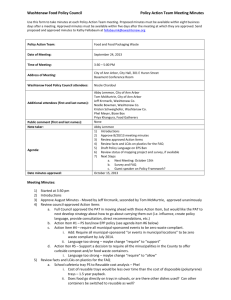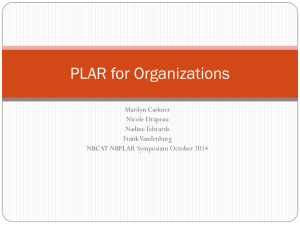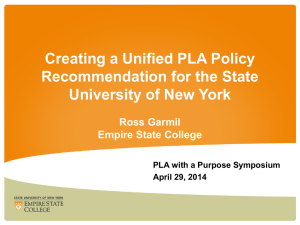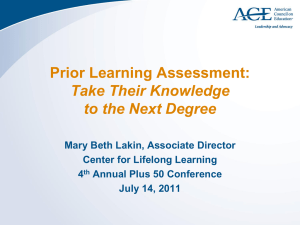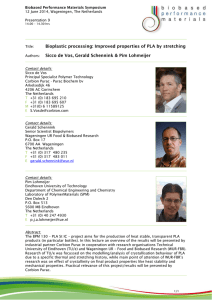WFPC DRAFT Minutes 10 21 14
advertisement
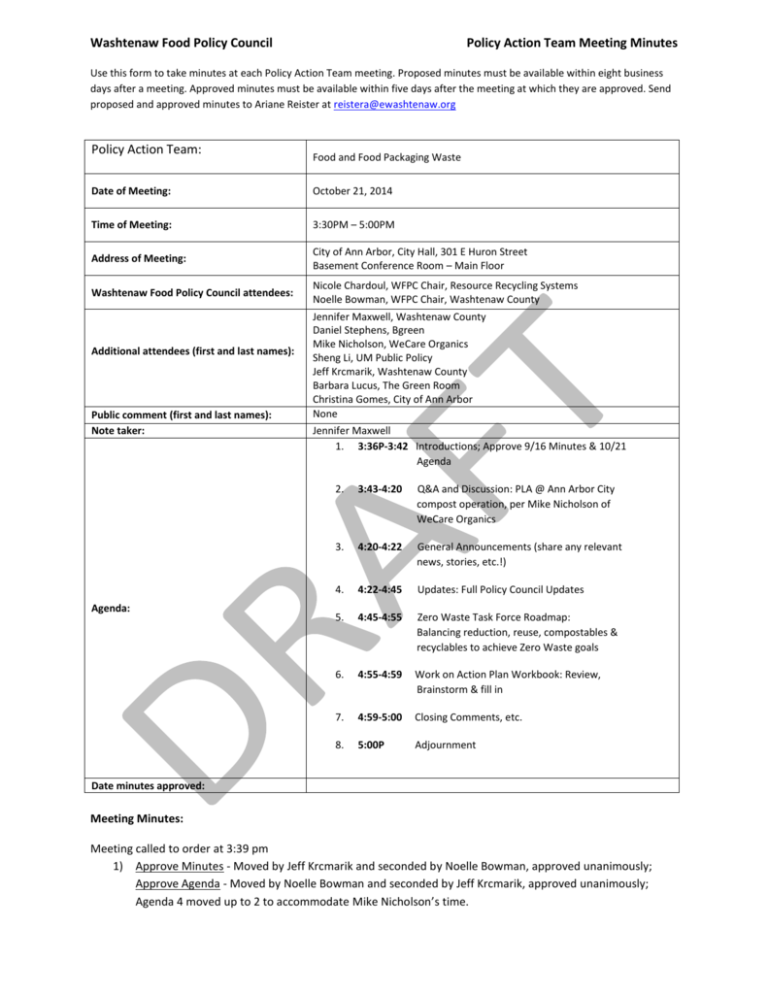
Washtenaw Food Policy Council Policy Action Team Meeting Minutes Use this form to take minutes at each Policy Action Team meeting. Proposed minutes must be available within eight business days after a meeting. Approved minutes must be available within five days after the meeting at which they are approved. Send proposed and approved minutes to Ariane Reister at reistera@ewashtenaw.org Policy Action Team: Food and Food Packaging Waste Date of Meeting: October 21, 2014 Time of Meeting: 3:30PM – 5:00PM Address of Meeting: City of Ann Arbor, City Hall, 301 E Huron Street Basement Conference Room – Main Floor Washtenaw Food Policy Council attendees: Nicole Chardoul, WFPC Chair, Resource Recycling Systems Noelle Bowman, WFPC Chair, Washtenaw County Additional attendees (first and last names): Public comment (first and last names): Note taker: Agenda: Jennifer Maxwell, Washtenaw County Daniel Stephens, Bgreen Mike Nicholson, WeCare Organics Sheng Li, UM Public Policy Jeff Krcmarik, Washtenaw County Barbara Lucus, The Green Room Christina Gomes, City of Ann Arbor None Jennifer Maxwell 1. 3:36P-3:42 Introductions; Approve 9/16 Minutes & 10/21 Agenda 2. 3:43-4:20 Q&A and Discussion: PLA @ Ann Arbor City compost operation, per Mike Nicholson of WeCare Organics 3. 4:20-4:22 General Announcements (share any relevant news, stories, etc.!) 4. 4:22-4:45 Updates: Full Policy Council Updates 5. 4:45-4:55 Zero Waste Task Force Roadmap: Balancing reduction, reuse, compostables & recyclables to achieve Zero Waste goals 6. 4:55-4:59 Work on Action Plan Workbook: Review, Brainstorm & fill in 7. 4:59-5:00 Closing Comments, etc. 8. 5:00P Adjournment Date minutes approved: Meeting Minutes: Meeting called to order at 3:39 pm 1) Approve Minutes - Moved by Jeff Krcmarik and seconded by Noelle Bowman, approved unanimously; Approve Agenda - Moved by Noelle Bowman and seconded by Jeff Krcmarik, approved unanimously; Agenda 4 moved up to 2 to accommodate Mike Nicholson’s time. Washtenaw Food Policy Council Policy Action Team Meeting Minutes Use this form to take minutes at each Policy Action Team meeting. Proposed minutes must be available within eight business days after a meeting. Approved minutes must be available within five days after the meeting at which they are approved. Send proposed and approved minutes to Ariane Reister at reistera@ewashtenaw.org 2) Q&A and Discussion: PLA @ Ann Arbor City compost operation, per Mike Nicholson of WeCare Organics: a. b. c. d. e. f. Daniel: Discussion is not about PLA, it’s about contamination. Noelle: Last month Barb provided a nice overview of PLA and how/what the life cycle is. So, there are multiple issues, about PLA as a product in general; but for the purposes of this conversation, to discuss why of opening Ann Arbor City’s compost facility to PLA would be a potential contaminant for the site, due to lack of current education and other factors. Mike: Thanks for the invitation and Noelle for reaching out. From a broader perspective, the City of Ann Arbor is my client. I’m here to listen, be objective, assist in any way to help the city move towards zero waste goals and with that being said: the choices we want to make with PLA acceptance must be acceptable to the City, my company and be cost effective. WeCare Organics is not afraid of PLA and BPI cert. materials; in fact, WeCare conducted first ever compostable zip lock bags trial run and found that it pretty much broken down after 3 weeks and had mostly no detectable pieces after 6 weeks. Nicole: Did you partake in national testing where certain sites were selected to conduct these trials? As San Jose did. Mike: We were not in association, this was independent. As I had previously explained to Daniel, contaminants received, ingoing and outgoing, final product and cost in the end need to be examined when talking about accepting PLA regularly. Where we’ve been with the City, from the start of the contract, with changes that have been made to move forward, towards zero waste-which they want to get to, with former employees Nancy Stone and Tom McMurtrie, is now 8 months into pilot residential curbside food waste collection for composting. There has been progression towards zero waste and changes from the initial contract in regards to what we will accept for composting. We have spoken about PLA and plastic, however this falls more as a City decision than ours in one sense since they are servicing and collecting the curbside compost. The city of Ann Arbor collects around 9 months a year and we receive year round although there is a big dip of incoming volume during those winter months. As I have said, there have been modifications to facility due to food waste collection and a potentially contamination from PLA collection could result because of unestablished public education for city residents about the collection of PLA and how to differentiate from other plastics, along with secured transportation to facility, etc. which all needs to be further thought out before moving forward. We will screen the first food waste materials in May and determine the quality and amount of contamination to see how the first year of residential food collection went. It doesn’t seem like a lot of contamination, there are currently virtually no odors on site and it looks to be good quality compost, although we can’t say for sure until we do the screening in May. I would say that where we are now and how things look, we would like to see results of this program with the compost operation and food collection and keep moving forward. For PLA collection the City and WeCare Organics would have to agree upon the issues put forth and have more discussions before jumping in. We are also in the middle of a contract where the City of Ann Arbor and WeCare Organics would, more than likely, need to amend the contract before opening up the collection to PLA. There are monetary issues with collecting. WeCare has certain vendors bring merchant waste to us where they collect yard waste and pay a tipping fee, there is revenue sharing with the city—independent contractors, is this curbside or merchant and how much is out there to participate in the program? A possible pilot could be to do create a space at the compost site and have some type of “demonstration” with merchant-received materials, where Washtenaw Food Policy Council Policy Action Team Meeting Minutes Use this form to take minutes at each Policy Action Team meeting. Proposed minutes must be available within eight business days after a meeting. Approved minutes must be available within five days after the meeting at which they are approved. Send proposed and approved minutes to Ariane Reister at reistera@ewashtenaw.org the material gets brought in with a private hauler, specifically dropped off and site observed for contamination. g. Daniel: Do you have capacity for 5000 tons more? Composting for restaurants? Who within the City of Ann Arbor’s job is responsible for this contract and negotiation? h. Mike/Christina: City council came to this decision, Tom McMurtrie was the lead and Sue McCormick was the lead administrator for executing contract. They have both left and will be speaking with Christina Gomes and others in the future. i. Daniel: Will the city include PLA curbside? There are two things, clear compostable cups with green stripe which recyclers don’t want because of contamination. I believe it was revised but in Waste Watcher issued four years ago there was confusion between BPI certified, starch or corn products. Bags used to be labeled as biodegradable and have mostly been removed due to the fact that they were oxi-degradable not actually compostable; they were made with by blending plastic with something that will degrade. The marketplace has eliminated many and now PLA labeled cups are the only ones that are an actual PLA, not forks and knifes, etc., which can be starch. j. Noelle: Will the municipal compost facility accept BPI-Certified compostable products generated from businesses or events now or at some point? k. Mike: for discussion purposes: a pilot program to take food waste and include PLA and BPI certified items [bags] is what we are considering, right now we are concentrating on the residential food scraps program first to make sure that is successful and generally once you open PLA up to curbside you open it up to all so to speak, I don’t think it’s wise to jump into city wide pick-up of those products, if we speak to commercial accounts and set up a drop-off zone and have them come in weight and set aside for a specific compost pile then this can be a starting point. l. Nicole: Tuthill Farms and compost site, accepts merchant food waste, and PLA from select preapproved haulers they trust and is relatively uncontaminated. m. Daniel: If Zingerman’s can drop something off tomorrow we need to do something. n. Nicole: for special events we can preapprove what will go to WeCare. o. Daniel: Why are we giving all business to Tuthill? They are even setting up curbside composting and allowing these things. We don’t need another private hauler composting bin in the area, we need city commercial composting. Right now everything that has PLA must go to Tuthill Farms and biodigesters will not take cups, plates and fiber products. p. Barb: I believe Rodger Bowser said they don’t use PLA. Jean Henry was pushing for PLA and now that she’s gone I’m not sure if they will be as adamant about it. q. Daniel: Rodger may not know. r. Nicole: City recommends that over the winter months but do suggest filling it up over winter, layer with paper cardboard, and once they resume they will collect the carts. s. Noelle: is that a Michigan hard winter thing or not? t. Christina: No, there are no drivers for the routes during that time. u. Nicole: People can keep layering the food in their bins with leaves and cardboard or selfhaul/drop-off over winter for Spring pick-up. v. Noelle: I think we need to get all the right people in the room to discuss this further to find a way to do a pilot PLA/BPI program next year. w. Mike: Spring time, April 1st, would work to get together and decide how to do a demonstration from merchant accounts to our facility and discuss what we need to put in place to support Washtenaw Food Policy Council Policy Action Team Meeting Minutes Use this form to take minutes at each Policy Action Team meeting. Proposed minutes must be available within eight business days after a meeting. Approved minutes must be available within five days after the meeting at which they are approved. Send proposed and approved minutes to Ariane Reister at reistera@ewashtenaw.org merchant’s ability to haul or find a hauler and this will need a tipping fee, $38/ton for food waste is current cost. x. Nicole: A few food composting sites have gone out of business; in order for this program to be successful we need to have vendors and options for people/merchants. y. Mike: The private sector will work itself out if there is a need. I don’t necessarily want to take in 5,000 pounds of waste only to put have it put on the city to handle, in event that current contract ends. This is City’s asset and they have to consider the future and how they want to operate before saying they are going to officially take something in that they may not be ready to handle. z. Daniel: There was no long-term plan, 20 years late.. aa. Mike: How much you’re collecting now if you’re maxing out at say 2000 lbs. of food scraps a bio digester may not be necessary, although biodigesters and compost goes well together, you can take a 100 tons down to 65 tons that can be then sent down to composting for all the left over solids. bb. Barb: Mike, Are you familiar at all with the National Organics Standards and the discussion about PLA and GMO not being usable on organic crops? cc. Mike: My understanding is they have come to a middle ground and way to characterize it, but not too familiar. dd. Daniel: If you produce more than you would sell more? ee. Mike: Not necessarily most material is used within the Ann Arbor area and then there is a point of diminishing return and how to get rid of it. Waste Management built their own facility and went to another site, max out 65,000 yards, 14,000tons. ff. Barb: If restaurants composted theirs what would happen with product? Maxed out? gg. Mike: We would not turn anyone away and should be able to sell it all. It’s a matter of what the market will bear and currently it’s moving now at a nice rate and price. Thank you and let me know about questions. hh. Daniel: Why not a 20 year contract with City and WeCare? ii. Noelle: Talking about these options is the first step here. jj. Jeff: I have the UM Feasibility study that I can pass along, though there are many variables and they are looking for consistency. kk. Christina: No PLA would be going to the biodigester. ll. Nicole: More focus on commercial rather than residential. mm. Mike: Let’s see what is being proposed, and then we can come together with our client and see if we can work something out. nn. Daniel: My Green is Thad’s new business, a compost hauling company. 3) General announcements: a. None. 4) Updates: Full Policy Council : a. Nicole: Working backwards, next week, Monday there will be a full policy meeting, prior to the Good Food Summit on Tuesday. Sharon Sheldon, Amanda Edmonds and I are giving presentation. The policy agenda was presented to the Board of Commissioners [BOC] in September and they loved and endorsed it so it will continue to move forward with the details. There will be a communications-specific meeting about outreach to public Monday, November 3rd. There was a sponsored film screening with Whole Foods featuring a film on organic gardens, Washtenaw Food Policy Council Policy Action Team Meeting Minutes Use this form to take minutes at each Policy Action Team meeting. Proposed minutes must be available within eight business days after a meeting. Approved minutes must be available within five days after the meeting at which they are approved. Send proposed and approved minutes to Ariane Reister at reistera@ewashtenaw.org b. c. d. e. f. getting the word out about our work and efforts. Food Day is this week at farmers markets in the area, Dexter, Ann Arbor, Ypsilanti, etc. As whole things are looking really good and continue to move forward. Noelle: Regarding the Washtenaw County Environmentally Preferable Purchasing (EPP) Policy, the proposed resolution and strikethrough policy has been sent to administration and goal is to be on November 5 BOC Ways & Means Agenda. Initially it was thought that the local vendor policy and EPP should be brought together, but it was decided internally that the two should be presented separately. Nicole: Someone from farmers and local action teams should be part of this local vendor policy like Tony, Josh and Nish, since Joanna is gone. Noelle: Submitted to administration FAQ sheet. Proposed resolution for changes, #5 is our item, included. Call for volunteers to populate EPP Policy Procedures, to solidify definition list, BPI, reusables, etc. Noelle: Also, meeting with Nicki Sandberg, from planning and zoning PAT, to discuss mapping communications options for public site and WFPC for internal. Also, there may be some potential grants for waste endeavors though county. Jeff: Through WCCSWM, we spoke of using funds to support capital improvement for zero waste movements. Restaurants that lack ability to get bins, etc. Can get critical mass if need assistance let us know. Have an unofficial list that we can use to help determine eligibility; find people with various needs and across different industries would be good. 5) Zero Waste Task Force Roadmap: Reuse, Reduction, Composting, Recycling Opportunities in working toward Zero Waste a. Noelle: Zero waste, reduction and reuse, composting, PLA, recycling, etc. b. Barb: Over the last month I’ve been pursuing reducing and reuse problems, pushing for reuse. Campaigns that already exist that push for reuse are the Be Straw Free—developed by Milo Cress a 9 year old out of Colorado & the Kill-A-Cup campaign—which is at colleges across country encouraging people to stop taking reusable cups. Using the campaigns to pursue a CTN show with campus students, restaurants in town who give incentives for reusable items. Hopefully a student can take on a project to scope out those businesses that give incentives, get more of the public aware of this and more businesses on board with incentives for the customer who brings their own cup, bag, etc. Milo Cress from Straw Free campaign is going to do a phone interview and maybe we can get a campaign here for restaurants to hold off handing out straws until being asked for a straw; could somehow combine these ideas with Waste Knot partners as a starting place. c. Daniel: There is a kid in Seattle doing a campaign on plastic straws lids. They are all headed to landfills and can end up in oceans, caught in dolphins’ lungs which kill them. Paper straws are made from virgin wood which is not good either. d. Noelle: Straw free would be something that is a cost saving incentive for restaurants. Kristen Schweighoefer said there is no public health reason to have the straws in restaurants. Employees have certain restrictions regarding they type of cup they use when drinking near food preparation areas to prevent contamination; however, if there were no straws there would be other reusable cup options. e. Barb: Would like to work on some type of push for reusable items, and will be interviewing Rodger Bowser on CTN’s Greenroom, however, a little confused because they do not use PLA according to them. Thought Zingerman’s was pushing to use it but maybe not. Washtenaw Food Policy Council Policy Action Team Meeting Minutes Use this form to take minutes at each Policy Action Team meeting. Proposed minutes must be available within eight business days after a meeting. Approved minutes must be available within five days after the meeting at which they are approved. Send proposed and approved minutes to Ariane Reister at reistera@ewashtenaw.org f. g. h. i. j. k. l. Noelle: Ann Arbor composting, in the spring, recycling ubiquitous, any off the spot recycling ideas? Christina: Volunteers or janitors are responsible for recycling in Ann Arbor Public Schools [AAPS] and there is a girl who is getting this started again. Nicole: “Extra pay” Incentive for teachers leading green team in schools, not sure if this was always around or if this is something new, but there is recycling and composting happening but not on a large scale. Waste free lunches? Barb: Would love to see people allowed to bring in empty cups for games through the UM athletics. Noelle: Volunteers for AAPS, UM empty cups, Straw Free, Bank of Ann Arbor reusable cups at Sonic Lunches, other ideas for zero waste? Event specific? Daniel: July 1st 2015 ordinance for zero waste?? Nicole: It’s a goal of Ann Arbor but no specific ordinance, the Washtenaw Food Policy Council is here for policy, education, advocacy, campaigning, support, and not necessarily programming or implementing, even though the EPP has dipped into that. 6) Closing Comments, etc.: a. Noelle: Will update Google Documents so all literature and work so far will be accessible. 7) Adjournment: a. Next Meeting on Tuesday, November 18th, 2014. Meeting adjourned 5:00pm
